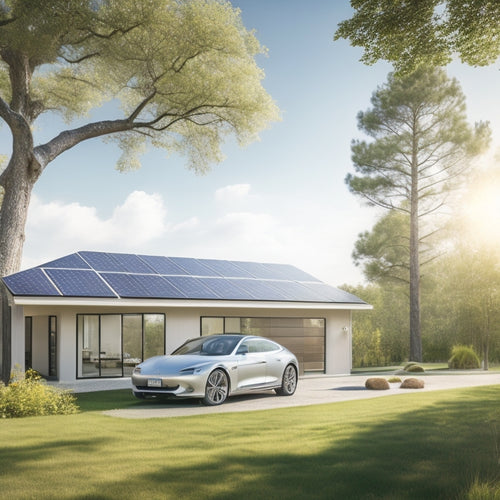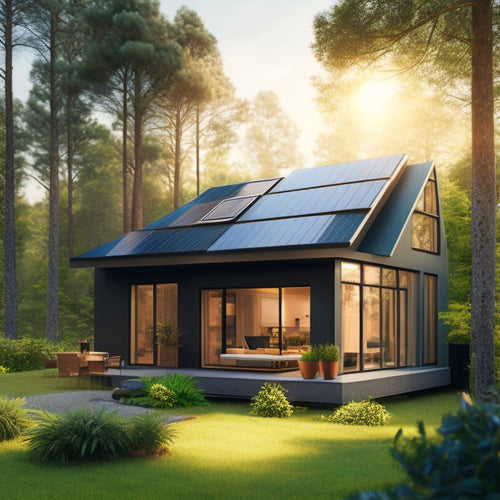
Best Solar Power Panels for Homes
Share
When searching for the best solar power panels for your home, you'll want to evaluate top brands like Panasonic, Tesla, and SunPower, which consistently report high customer satisfaction ratings. Efficiency ratings above 20% will maximize energy output, and durable panels that can withstand harsh weather conditions are a must. Budget-friendly options are emerging due to technological advancements, and financing options like PPAs and solar leases can reduce upfront costs. As you weigh your options, prioritize key features like efficiency, durability, and warranties to guarantee you're getting the most from your solar power investment - and there's more to investigate to find the perfect fit for your home.
Key Takeaways
- High-efficiency solar panels with ratings above 20% maximize energy output and are ideal for homes with limited roof space.
- Top brands like Panasonic, Tesla, and SunPower offer durable panels with high customer satisfaction ratings and comprehensive warranties.
- Consider budget-friendly options and financing methods like PPAs and solar leases to reduce upfront costs and make renewable energy viable.
- Look for certifications from reputable bodies like UL and IEC, and ensure panels have extensive warranties of at least 25 years for durability and performance.
- Assess key features like efficiency rating, temperature coefficient, and compatibility with inverters and monitoring systems when selecting the best solar power panels for homes.
Top Solar Panel Brands
Several top-tier solar panel brands dominate the market, offering high-efficiency modules that can considerably reduce your energy bills.
You're likely to come across familiar names like Panasonic, Tesla, and SunPower, which consistently rank high in customer satisfaction surveys.
These top-rated manufacturers have built a reputation for producing high-quality solar panels that can withstand harsh weather conditions and last for decades.
When choosing a solar panel brand, you should consider factors beyond just efficiency and cost.
Look for brands that offer extensive warranties, reliable customer support, and a strong track record of durability.
You'll also want to research each brand's manufacturing process, ensuring they adhere to strict quality control standards.
Efficiency and Durability Matters
By now, you've likely narrowed down your search to reputable brands, but it's time to investigate deeper into the specifics that truly matter: efficiency and durability.
When it comes to solar panels, efficiency is a vital performance metric that determines how much power you'll get from each unit. Look for panels with high efficiency ratings, typically above 20%, to maximize your energy output.
Durability is also essential, as it directly impacts the longevity expectations of your solar panel system. A durable panel can withstand harsh weather conditions and last for 25 years or more, guaranteeing a strong return on investment.
Consider panels with durable materials, sturdy construction, and rigorous testing to confirm they can withstand the elements. Additionally, check the warranty and maintenance requirements to make sure you're covered in case of any issues.
Budget-Friendly Solar Options
When you're looking to go solar on a budget, you'll want to evaluate affordable panel options that won't break the bank.
You'll also need to investigate low-cost installation methods that can help reduce upfront costs.
Affordable Panel Options
Installing solar power panels can seem like a costly undertaking, but affordable options are emerging, making it more feasible for homeowners to switch to renewable energy.
You're no longer limited to high-end solar panels to utilize the power of the sun. With advancements in technology, manufacturers are now offering budget-friendly solar panels that are both efficient and affordable.
You can investigate solar panel financing options, which allow you to install solar panels with little to no upfront cost. Many financing companies offer competitive rates and flexible repayment terms, making it easier to switch to solar power.
Additionally, government incentives, such as tax credits and rebates, can greatly reduce the overall cost of installing solar panels. By taking advantage of these affordable options, you can start generating clean energy and reducing your reliance on the grid.
With the right financing and incentives, you can enjoy the benefits of solar power without breaking the bank.
Low-Cost Installation Methods
You're looking for ways to cut costs on solar panel installation without sacrificing efficiency. One option is to contemplate DIY installation, where you take on some or all of the installation process yourself. This can help reduce labor costs, but be sure you have the necessary skills and follow safety guidelines.
Another approach is to investigate financing options, such as power purchase agreements (PPAs) or solar leases, which can provide lower upfront costs in exchange for a monthly payment. These financing options can help spread the cost of installation over time, making solar energy more accessible.
Additionally, look for installers that offer competitive pricing or bundle deals that include installation, monitoring, and maintenance. Some companies also offer free or low-cost consultations to assess your energy needs and provide customized quotes.
Economical Energy Solutions
As you investigate ways to make solar energy more affordable, consider the budget-friendly solar options available in the market. Economical energy solutions can make renewable energy a viable choice for homeowners.
You can take advantage of financial incentives, such as tax credits and rebates, to reduce the upfront cost of solar panel installation. Additionally, consider purchasing solar panels with lower efficiency ratings, which can be more affordable without sacrificing too much energy output.
Another option is to opt for a smaller solar panel system that still meets your energy needs. This approach can help you save money on installation costs while still utilizing the power of renewable energy.
Moreover, look for solar panel manufacturers that offer financing options or power purchase agreements, which can help spread the cost of solar energy over time.
High-Efficiency Solar Panels
Several top-tier manufacturers have developed high-efficiency solar panels that boast impressive power outputs per unit area. These panels are designed to maximize energy production, making them ideal for homeowners who want to get the most out of their solar investment.
You'll benefit from high performance materials and innovative technologies that enable these panels to convert sunlight into electricity with unparalleled efficiency.
High-efficiency solar panels typically feature advanced cell structures, such as bifacial or PERC (Passivated Emitter and Rear Cell) technology, which allow them to utilize more energy from the sun. These designs enable the panels to produce more power per unit area, resulting in higher wattage outputs.
For example, some high-efficiency panels can produce up to 440 watts, while standard panels may only reach 300 watts.
When you choose high-efficiency solar panels, you'll enjoy faster energy payback times and reduced carbon emissions.
These panels are perfect for homeowners with limited roof space or those who want to minimize their environmental impact. With high-efficiency solar panels, you can generate more power in less space, making them an attractive option for those who demand maximum energy output.
Best Solar Panels for Small Homes
When you're considering solar panels for your small home, you need to prioritize space efficiency since you have limited roof real estate.
You'll want to maximize energy output while minimizing the number of panels, so look for models that offer high power density.
Space Efficiency Matters
Opting for solar power in a small home requires careful consideration of the limited roof space available. You need to prioritize space efficiency to maximize energy production.
Space-saving designs and compact installations are essential to get the most out of your roof's real estate. Look for solar panels with a higher power density, which means they produce more energy per square foot. This way, you can generate more power without sacrificing too much roof space.
When selecting solar panels, consider the module efficiency, which is the percentage of sunlight converted into electricity. Higher module efficiency means more power from a smaller area.
Additionally, some solar panels feature a more compact design, with smaller gaps between modules, further increasing energy production per square foot.
Energy Output Quality
As you maximize your roof's energy-producing potential, it's equally important to contemplate the quality of the energy output. The best solar power panels for small homes should deliver a high-quality energy output to guarantee your system operates efficiently.
When evaluating energy output quality, focus on the panel's energy conversion efficiency. This measures how well the panel converts sunlight into usable electricity. Look for panels with high conversion efficiency rates, typically above 20%. Higher efficiency means more power per hour of sunlight, resulting in greater energy independence.
Another significant factor is panel longevity. High-quality panels are built to last, with a longer lifespan translating to more consistent energy production over time.
Assess the manufacturer's warranty and expected lifespan, aiming for panels with a warranty of at least 25 years. By prioritizing energy output quality, you'll enjoy a more reliable and efficient solar power system for your small home.
Solar Panels for Large Homes
Large homes typically require more energy to power their numerous appliances, lighting, and HVAC systems, which can lead to higher electricity bills.
When considering solar panels for your large home, you'll need to prioritize high-efficiency solar panel types that can maximize energy production within a given installation space.
Monocrystalline silicon solar panels are an excellent choice for large homes, offering higher energy output per unit area compared to polycrystalline or thin-film solar panels.
Their high power density enables you to generate more electricity within a smaller installation space, making them ideal for large homes with limited roof space.
Additionally, monocrystalline solar panels tend to perform better in low-light conditions, ensuring you can capture energy even during cloudy days.
To optimize energy production, consider installing solar panels on multiple roof faces or utilizing a tracking system to maximize exposure to direct sunlight.
Installation and Maintenance Costs
Several factors contribute to the overall cost of solar power panels for your home, including the installation and maintenance costs.
When considering solar power panels, it's crucial to factor in these expenses to get an accurate estimate of the total cost.
You can benefit from installation incentives, such as tax credits or rebates, which can greatly reduce the upfront cost.
However, maintenance costs should also be taken into account. Here are some maintenance tips to keep in mind:
- Regularly clean your solar panels to guarantee maximum energy output
- Inspect your system for damage or malfunctioning components
- Trim nearby trees or vegetation to guarantee ideal sunlight exposure
- Check your system's wiring and connections for signs of wear
- Consider hiring a professional for annual maintenance checks
Warranties and Certifications Explained
Your solar power panel investment comes with warranties and certifications that protect your system's performance and assure compliance with industry standards.
These warranties and certifications provide you with peace of mind, guaranteeing that your solar power system operates efficiently and effectively over its lifespan.
There are two primary warranty types: product warranties and performance warranties.
Product warranties typically cover defects in materials and workmanship, while performance warranties assure a certain level of energy output. Look for manufacturers that offer extensive warranties with a minimum of 25 years of coverage.
Certification bodies, such as UL (Underwriters Laboratories) and IEC (International Electrotechnical Commission), verify that solar power panels meet rigorous safety and performance standards.
These certifications guarantee that your system is safe, reliable, and efficient.
When selecting a solar power panel, make sure to check for certifications from reputable bodies to assure compliance with industry standards.
Key Features to Consider
Three significant aspects to evaluate when selecting the best solar power panels for your home are efficiency, temperature coefficient, and durability.
You want to guarantee that your solar panels can efficiently convert sunlight into electricity, perform well in varying temperatures, and withstand environmental elements.
When researching solar panels, consider the following key features:
-
Efficiency rating: A higher rating means more electricity generated per hour of sunlight. Look for panels with high efficiency ratings (above 20%) to maximize energy production.
-
Temperature coefficient: A lower coefficient indicates better performance in high temperatures. This is vital, as high temperatures can reduce energy output.
-
Durability and warranty: Assess the panel's construction, materials, and warranty offered. A longer warranty period (25 years or more) provides assurance of the panel's durability.
-
Compatibility with inverters and monitoring systems: Confirm the panels are compatible with your inverter and monitoring system for peak energy production and tracking.
-
Compliance with solar technology trends and environmental benefits: Opt for panels that align with the latest solar technology trends and offer significant environmental benefits, such as reduced carbon emissions and energy independence.
Frequently Asked Questions
Can I Install Solar Panels on a Metal Roof?
Can you utilize the power of the sun on a metal roof? Absolutely! You'll reap metal roof advantages like durability and longevity, but consider installation considerations like secure fastening and waterproofing to guarantee a seamless solar panel setup.
Do Solar Panels Work During Power Outages?
You're wondering if your solar panels will keep the lights on during a power outage. Unfortunately, they won't - unless you have a battery backup system, which stores excess energy for later use, providing a reliable power outage solution and ensuring continuous solar panel functionality.
How Do I Clean My Solar Panels Effectively?
Did you know 15% of solar energy is lost due to dirt and debris? To maximize energy output, you'll need to clean your solar panels regularly. For effective solar panel maintenance, use a soft-bristled brush and mild soap, and adopt gentle cleaning techniques to avoid scratches.
Can I Add Solar Panels to an Existing System?
You can expand your solar setup by adding new panels, but verify solar panel compatibility to maximize energy output. Consider your system's capacity, inverter limitations, and electrical connections before scaling up your solar energy expansion to avoid inefficiencies.
Are Solar Panels Resistant to Hail and Extreme Weather?
You'll be relieved to know that 99% of solar panels survive hail storms unscathed. When it comes to weather durability, modern solar panels are built to withstand extreme conditions, including hail damage, with tempered glass and sturdy frames protecting the photovoltaic cells.
Related Posts
-

Why Invest in Solar Car Battery Chargers Online?
By investing in a solar car battery charger online, you're not only reducing your reliance on fossil fuels but also o...
-

What Role Do Unicycles Play in Urban Transport?
As you navigate through congested city streets, unicycles emerge as a viable solution, slashing carbon emissions by u...
-

Reduce Solar Panel Cost for Your Small Home
By evaluating your energy needs, choosing the right installer, and selecting cost-effective solar panel options, you ...


